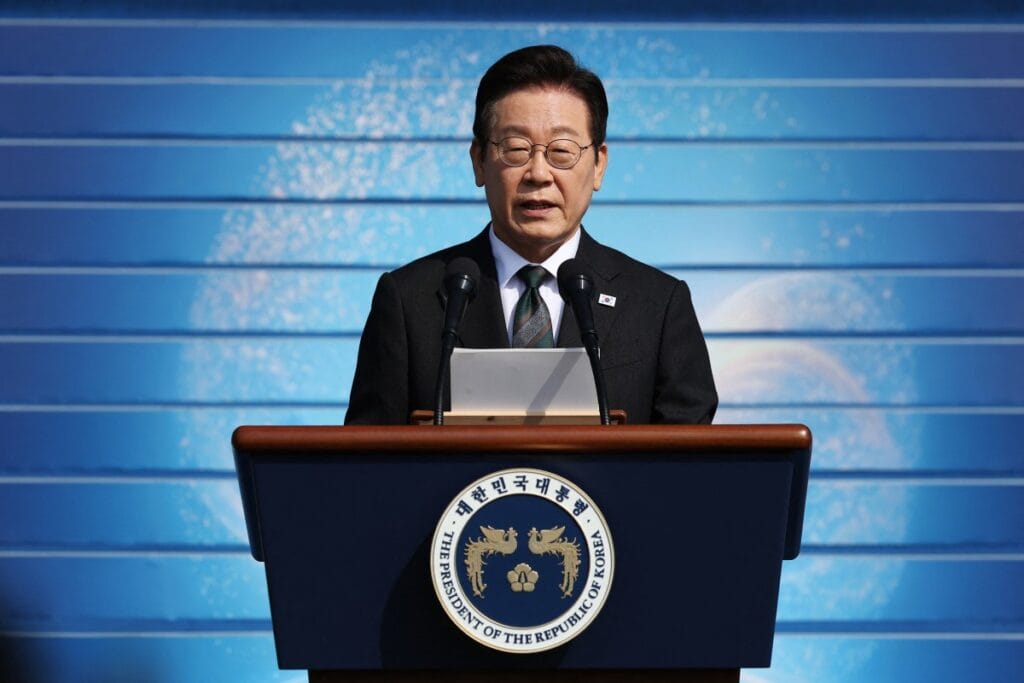October 21, 2025
SEOUL – President Lee Jae Myung said Monday his administration will push for research and development through increased government spending to nurture Korea’s defense and aviation industry, a new export driver in Asia’s fourth-largest economy.
Lee also stressed that the development of South Korea’s defense industry will contribute to achieving self-reliant defense, in line with his liberal administration’s bid to regain wartime operational control of South Korea’s military from the United States based on the Seoul-Washington alliance.
“By 2030, South Korea will inject a considerable amount of state budget into defense R&D and aviation R&D to secure key military technology and weapons for future defense systems,” Lee said in his opening remarks of the Seoul International Aerospace and Defense Exhibition 2025’s opening ceremony at Kintex in Goyang, Gyeonggi Province.
Lee did not elaborate on the size of the budget spending during the suggested time frame, but the liberal president said the investment will go to military-purpose semiconductor chips and independent space development, alongside other destinations.
“Industries that once only catered to domestic demand have become ones the world reaches out to,” Lee said.
Later during the debate session with some 20 government officials and 90 representatives from the private sector, Lee echoed his previous stance on the need for self-reliant defense, as he previously did on Armed Forces Day early this month.
“It is hard for me to accept that there are still some who believe South Korea cannot secure self-reliant national defense and must rely on others for its defense,” Lee said, adding that the development of the defense industry would imply that such doubts could die down.
On Oct. 1, Lee said at a ceremony to mark the 77th Armed Forces Day that South Korea “must not depend on anyone else, but strengthen our own power,” adding that Seoul will “lead” a joint defense posture with Washington.
At Seoul ADEX 2025, Lee highlighted a need to foster a stronger defense industry ecosystem and to tackle the monopoly held by domestic firms.
In his opening speech, Lee suggested lowering the entry bar for defense manufacturers and heightening the chances of private-sector technologies being adopted by the military, in part through the introduction of a system that would fast-track the application of such private-sector technologies.
Lee also said during the event that developing the defense industry must involve boosting domestic production. According to presidential spokesperson Kim Nam-joon on Monday, Lee during the debate hinted at introducing measures to support homegrown military semiconductor-makers and their parts-makers, amid sluggish adoption of homegrown military chips.
Kim also said the president warned of actions against price squeezing by defense manufacturers, by augmenting the level of civil servants under antitrust authorities, during the closed-door debate.
Lee’s remarks follow the presidential office’s earlier suggestion that South Korean bidders are seeking to win a combined $56.2 billion worth of new defense deals in Europe, as South Korea eyes ranking among the global top four defense industry powerhouses.
Lee’s chief of staff Kang Hoon-sik on Sunday embarked on a trip to European countries as the current administration seeks to win more defense contracts on the continent. Kang did not disclose further details about the trip. Presidential spokesperson Kim, however, denied claims by conservative Rep. Kim Hyung-dong on Monday that Ukraine, which is currently at war with Russia, would be one of Kang’s destinations on the trip.
The biennial event is to showcase some 600 pieces of military equipment from 35 countries, according to the organizer. The “business day” segment exclusively for industry professionals will run from Monday to Friday.







